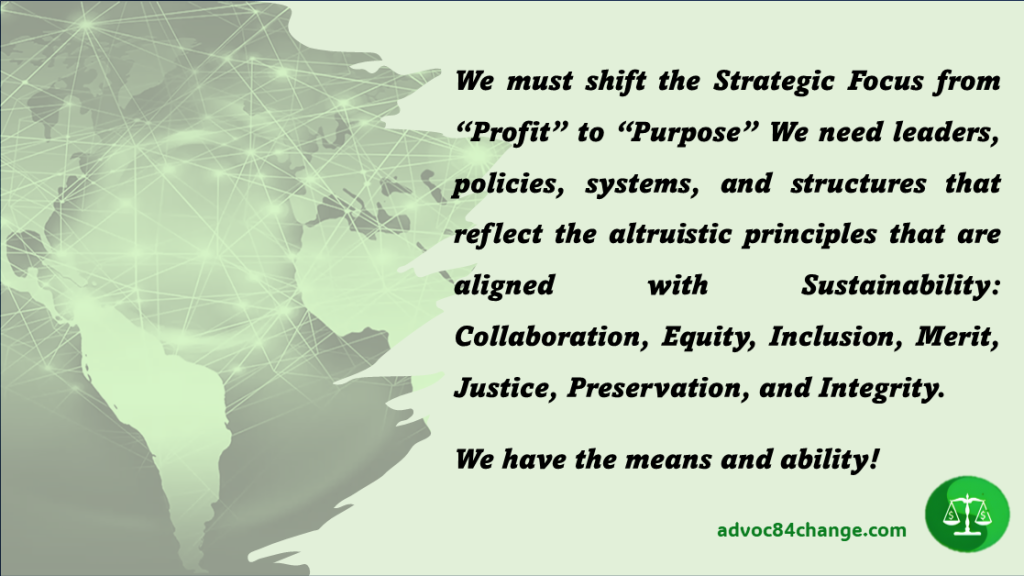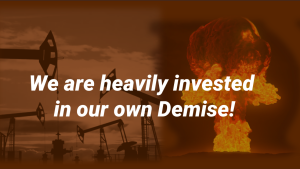The Onus
of
Economic Reform
Global Economic Transformation:
A Call for Equity and Sustainability
The current state of global economics is shaped by influential macro systems such as Governments, Finance (as represented by the IMF and the World Bank), Business (as represented by the WEF), and the Military Complex. Together, these agencies bear the responsibility of determining the well-being of nations and the planet. However, the inherently divisive and competitive nature of our global governance structure poses a significant challenge to addressing pressing global challenges, leading to persisting inequities.
Consider the disparities in global economics outlined in reports such as the “World Bank Report on Global Economics/Poverty, Year in Review: 2018.” While there has been significant progress in reducing extreme poverty globally, millions still live in dire conditions, with Sub-Saharan Africa bearing the brunt of poverty. Moreover, forced displacement, climate change, air pollution, waste management, sanitation, nutrition, education, gender equality, debt dynamics, urbanization, financial inclusion, and other issues continue to plague societies worldwide.
Nations that contribute the most in terms of resources often find themselves amongst the poorest in the world, highlighting fundamental questions about the fairness and equity of our economic systems. Furthermore, countries with the lowest contributions to emissions suffer the most from climate change, emphasizing the urgent need for systemic reform.
Institutions like the IMF and WEF wield significant influence over global economic policies. However, their impact has coincided with widening inequality, environmental degradation, and social unrest. This dissonance between their professed objectives and the prevailing global socio-economic reality demands a reevaluation of their impact on the greater good.
The introduction of terms like “Coopetition” as a response to the climate crisis underscores the desperation to preserve an economic model that has contributed to our current predicament. Previous attempts at international cooperation have yielded limited results, as the underlying competitive paradigm remains unchanged.

Our global social conditions establish that the status quo perpetuated by institutions like the IMF and WEF is inadequate to address the pressing issues of our time. The reluctance to embrace fundamental change stems from the fact that the very beneficiaries of this system are tasked with its reform. This inherent conflict of interest underscores the urgency of systemic transformation.
To forge a path towards a more inclusive, sustainable, and equitable future, we must challenge the prevailing economic orthodoxy. The IMF and WEF, as stalwarts of the current system, must be open to introspection and reform. It is time to move beyond rhetoric and translate ideals into tangible actions that prioritize the well-being of people and the planet.
Jeffrey Sachs’ call to expand the G20 to the G21 by inviting the chairperson of the African Union is a step in the right direction towards global inclusion in decision-making. Giving representation to 1.4 billion people from Africa at the table for finance is essential for creating a more equitable and just economic order.
In embracing a new paradigm, we embark on a collective journey towards a global economic model that truly serves the greater good—a model that transcends the limitations of competition and embraces cooperation for the betterment of humanity and the preservation of our precious environment.
The Five Core Principles
of
Sustainable Transformation
- Inclusion: Inclusion is the cornerstone of a sustainable economic system, emphasizing fair and equitable representation at decision-making levels. By ensuring global inclusion, diverse perspectives and voices are heard, leading to more comprehensive and effective policies. Inclusive economic systems prioritize marginalized communities, promote diversity, and foster social cohesion. Moreover, they enable equitable access to opportunities, resources, and benefits, thereby reducing disparities and promoting shared prosperity.
- Equity: Equity entails fair and just distribution of resources, opportunities, and benefits within a society. In a sustainable economic system, equity ensures that all individuals have access to essential goods and services, regardless of background or circumstance. By valuing resources and skills equally and providing equitable access to markets and financing, economies can address systemic inequalities and promote social justice. Moreover, equitable economic models prioritize the needs of vulnerable populations, mitigate disparities, and foster inclusive prosperity.
- Meritocracy: Meritocracy promotes leadership, business, and employment practices based on merit and performance rather than nepotism or privilege. In a sustainable economic system, meritocracy ensures that individuals are rewarded and empowered based on their contributions and achievements. By fostering a culture of meritocracy, economies encourage innovation, entrepreneurship, and talent development. Moreover, merit-based systems promote accountability, efficiency, and competitiveness, driving sustainable production and development.
- Institutional Integrity: Institutional integrity is essential for upholding the rule of law, promoting transparency, and combating corruption within public institutions. In a sustainable economic system, institutional integrity ensures that governments, courts, and regulatory bodies operate ethically and serve the public interest. By safeguarding against corruption and exploitation, institutions uphold the social contract and maintain trust in governance. Moreover, institutional integrity fosters accountability, legitimacy, and investor confidence, contributing to economic stability and sustainable development.
- Preservation: Preservation emphasizes the protection and sustainable management of natural resources and the environment. In a sustainable economic system, preservation is a core strategic objective that prioritizes conservation, sustainability, and minimalization of waste. By adopting practices that minimize environmental impact, economies mitigate risks associated with climate change, biodiversity loss, and resource depletion. Moreover, preservation promotes long-term viability, resilience, and prosperity by ensuring the responsible stewardship of natural assets for future generations.
The Three Key Features of a
Sustainable Economy

- Poverty Floor (Universal Basic Income): A poverty floor, exemplified by Universal Basic Income (UBI), serves as a fundamental pillar of a sustainable economy. UBI ensures that every individual, regardless of socioeconomic status, has access to a minimum standard of living. By providing a guaranteed income to all citizens, UBI addresses inequality, reduces poverty, and fosters economic stability. This feature not only alleviates financial hardship but also empowers individuals to pursue education, entrepreneurship, and meaningful contributions to society. Moreover, UBI fosters social cohesion by fostering a sense of security and dignity among citizens.
- Wealth Ceiling: Implementing a wealth ceiling is essential for redirecting resources towards the common good and preventing excessive accumulation of wealth in the hands of a few. By imposing limits on individual wealth accumulation, societies can ensure that resources are reinvested back into communities, infrastructure, and sustainable development initiatives. A wealth ceiling promotes economic fairness, reduces inequality, and fosters inclusive growth. Moreover, it encourages responsible wealth distribution, promotes social mobility, and mitigates the adverse effects of wealth concentration, such as political influence and societal divisions.
- Balanced and Equitable Currency Valuation System: A balanced and equitable currency valuation system is crucial for accurately reflecting the value of natural resources, human capital, and societal contributions within an economy. Unlike subjective valuation criteria influenced by political and industrial affiliations, an objective valuation system considers factors such as supply, demand, and societal impact. By valuing resources and skills based on their true worth, economies can prioritize sustainable practices, promote environmental conservation, and ensure fair compensation for labor. Additionally, an equitable currency valuation system fosters transparency, accountability, and trust in economic transactions, thereby strengthening financial integrity and promoting long-term economic stability.

Economic Transformation is a reality that cannot be avoided in our pursuit of Sustainability. The case for economic reform is well and clearly established.
Our current socioeconomic model is the root cause of our sustainability challenges, and an immediate and meaningful response to those threats is required.
We have the intellectual and technological capability to create a sustainable global economic model and implement a feasible transformation plan. We must Act Now!
Tony Redman
“All content © 2024 Mark Anthony Redman / Advoc8 4 Change. Unauthorized reproduction prohibited.”
